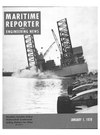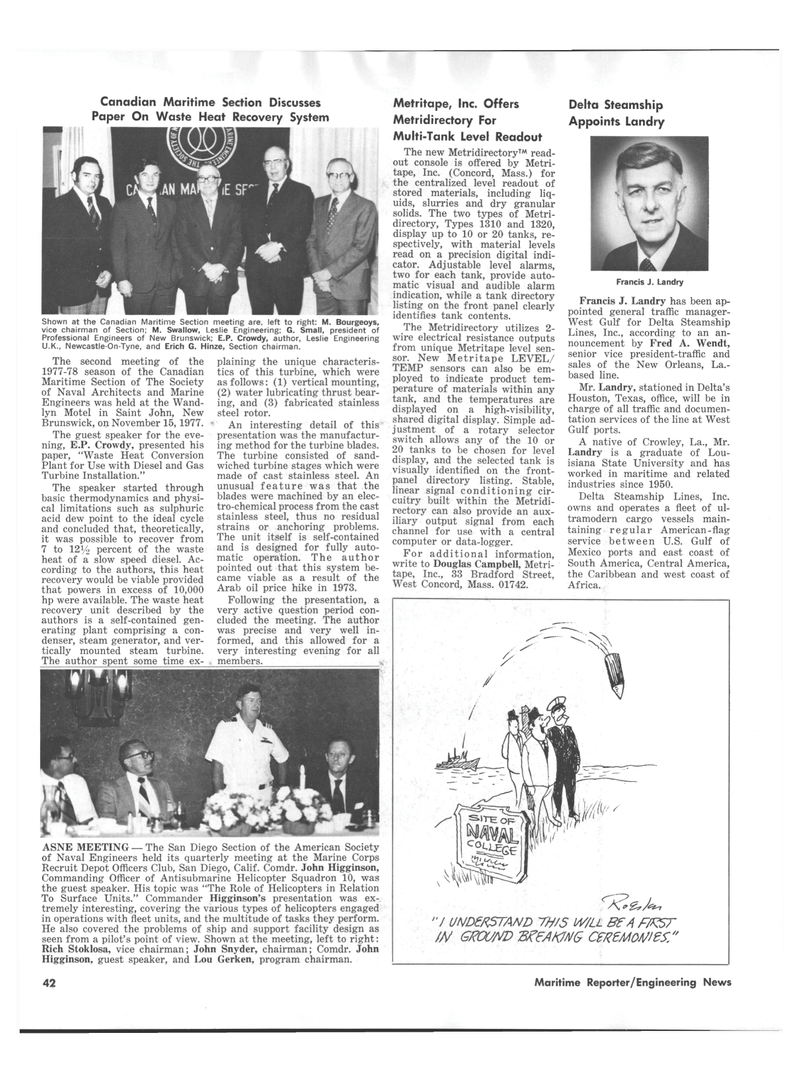
Page 40: of Maritime Reporter Magazine (January 1978)
Read this page in Pdf, Flash or Html5 edition of January 1978 Maritime Reporter Magazine
"J UNDERSTAND 7&/S W/LL BE A F/FSF IN GFOUJVD "BFEAKJMG CfReMOA/ies/*
ASNE MEETING — The San Diego Section of the American Society of Naval Engineers held its quarterly meeting at the Marine Corps
Recruit Depot Officers Club, San Diego, Calif. Comdr. John Higginson,
Commanding Officer of Antisubmarine Helicopter Squadron 10, was the guest speaker. His topic was "The Role of Helicopters in Relation
To Surface Units." Commander Higginson's presentation was ex- tremely interesting, covering the various types of helicopters engaged in operations with fleet units, and the multitude of tasks they perform.
He also covered the problems of ship and support facility design as seen from a pilot's point of view. Shown at the meeting, left to right:
Rich Stoklosa, vice chairman; John Snyder, chairman; Comdr. John
Higginson, guest speaker, and Lou Gerken, program chairman. 42 Maritime Reporter/Engineering News
Canadian Maritime Section Discusses
Paper On Waste Heat Recovery System
Metritape, Inc. Offers
Metridirectory For
Multi-Tank Level Readout
The new Metridirectory™ read- out console is offered by Metri- tape, Inc. (Concord, Mass.) for the centralized level readout of stored materials, including liq- uids, slurries and dry granular solids. The two types of Metri- directory, Types 1310 and 1320, display up to 10 or 20 tanks, re- spectively, with material levels read on a precision digital indi- cator. Adjustable level alarms, two for each tank, provide auto- matic visual and audible alarm indication, while a tank directory listing on the front panel clearly identifies tank contents.
The Metridirectory utilizes 2- wire electrical resistance outputs from unique Metritape level sen- sor. New Metritape LEVEL/
TEMP sensors can also be em- ployed to indicate product tem- perature of materials within any tank, and the temperatures are displayed on a high-visibility, shared digital display. Simple ad- justment of a rotary selector switch allows any of the 10 or 20 tanks to be chosen for level display, and the selected tank is visually identified on the front- panel directory listing. Stable, linear signal conditioning cir- cuitry built within the Metridi- rectory can also provide an aux- iliary output signal from each channel for use with a central computer or data-logger.
For additional information, write to Douglas Campbell, Metri- tape, Inc., 33 Bradford Street,
West Concord, Mass. 01742.
Delta Steamship
Appoints Landry
Francis J. Landry
Francis J. Landry has been ap- pointed general traffic manager-
West Gulf for Delta Steamship
Lines, Inc., according to an an- nouncement by Fred A. Wendt, senior vice president-traffic and sales of the New Orleans, La.- based line.
Mr. Landry, stationed in Delta's
Houston, Texas, office, will be in charge of all traffic and documen- tation services of the line at West
Gulf ports.
A native of Crowley, La., Mr.
Landry is a graduate of Lou- isiana State University and has worked in maritime and related industries since 1950.
Delta Steamship Lines, Inc. owns and operates a fleet of ul- tramodern cargo vessels main- taining regular American-flag service between U.S. Gulf of
Mexico ports and east coast of
South America, Central America, the Caribbean and west coast of
Africa.
Shown at the Canadian Maritime Section meeting are, left to right: M. Bourgeoys, vice chairman of Section; M. Swallow, Leslie Engineering; G. Small, president of
Professional Engineers of New Brunswick; E.P. Crowdy, author, Leslie Engineering
U.K., Newcastle-On-Tyne, and Erich G. Hinze, Section chairman.
The second meeting of the 1977-78 season of the Canadian
Maritime Section of The Society of Naval Architects and Marine
Engineers was held at the Wand- lyn Motel in Saint John, New
Brunswick, on November 15,1977.
The guest speaker for the eve- ning, E.P. Crowdy, presented his paper, "Waste Heat Conversion
Plant for Use with Diesel and Gas
Turbine Installation."
The speaker started through basic thermodynamics and physi- cal limitations such as sulphuric acid dew point to the ideal cycle and concluded that, theoretically, it was possible to recover from 7 to 121/2 percent of the waste heat of a slow speed diesel. Ac- cording to the authors, this heat recovery would be viable provided that powers in excess of 10,000 hp were available. The waste heat recovery unit described by the authors is a self-contained gen- erating plant comprising a con- denser, steam generator, and ver- tically mounted steam turbine. plaining the unique characteris- tics of this turbine, which were as follows: (1) vertical mounting, (2) water lubricating thrust bear- ing, and (3) fabricated stainless steel rotor.
An interesting detail of this presentation was the manufactur- ing method for the turbine blades.
The turbine consisted of sand- wiched turbine stages which were made of cast stainless steel. An unusual feature was that the blades were machined by an elec- tro-chemical process from the cast stainless steel, thus no residual strains or anchoring problems.
The unit itself is self-contained and is designed for fully auto- matic operation. The author pointed out that this system be- came viable as a result of the
Arab oil price hike in 1973.
Following the presentation, a very active question period con- cluded the meeting. The author was precise and very well in- formed, and this allowed for a very interesting evening for all

 39
39

 41
41
